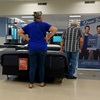
A customer waits to order food at a Miami McDonald’s on July 26, 2022. McDonald’s CEO expects the U.S. to experience a mild slowdown, and says customers are reluctant to buy more or bulk up their orders.
Joe Radle/Getty Images
Hide title
Change the title
Joe Radle/Getty Images

A customer waits to order food at a Miami McDonald’s on July 26, 2022. McDonald’s CEO expects the U.S. to experience a mild slowdown, and says customers are reluctant to buy more or bulk up their orders.
Joe Radle/Getty Images
From banks to burger joints, the U.S. economy is showing signs of stress as nervous shoppers scale back their spending and savvy lenders tighten their grip on credit.
The Commercial Tax Department’s report will be released on Thursday Economic growth is expected to be slower in the first three months of the year than in the previous quarter.
And the economy is predicted to lose more steam in the coming months as rising prices and higher interest rates hit households and businesses.
“Our basic expectation is a mild slowdown in the U.S.,” McDonald’s CEO Chris Kempczynski said this week.
While the fast-food chain has posted strong sales so far in 2023, he said on an earnings call with investors that customers are less enthusiastic after two years of rising food costs.
“Things like — did anyone add fries to their order?” Kempczynski said. “In most of our markets around the world we’re seeing it go down — a little bit — but it’s still going down.”

Desiree Prince, who lives in Virginia, says she’s more budget conscious now than ever, and making decisions about what she spends based on the price index.
“Once upon a time, I might have said, ‘I want to have steak and potatoes for dinner,'” Prince said. “Now it’s like, ‘Let’s see what’s in the fridge and put together a meal from what I already have.'”
The prince, who lives in Alexandria, is planning a vacation this summer with his mom and sister, but since airfares have risen nearly 18% this year, they are limiting themselves to places they can drive to.
“We have to be a little selective about what we do on vacation,” Prince said. “Do we want to pet dolphins? That’s a little expensive. Maybe we’ll do a free national park. So we’ve been frugal with our trip.”
Consumers spend enough to keep the economy afloat
Consumer spending like Prince is the biggest driver of the US economy. In recent months it has decreased, though not completely stopped.
“The U.S. consumer is the firewall between a recession and an economy moving forward. Now the firewall is solid,” said Mark Jandy, chief economist at Moody’s Analytics.
People may not be spending aggressively, “but they’re spending enough to keep the economy moving forward,” he said.
Jandy believes the U.S. can avoid an outright recession this year, but he argues it won’t be easy, especially after the collapse of Silicon Valley Bank and Signature Bank and other banks’ lending declines.
“The Federal Reserve is still raising interest rates,” Zandi said. “You throw the worst effects of the banking crisis into the mix, and it suggests that growth will be on the softer side for the rest of this year and next.”
Mike Kading, who builds and leases apartments in Minnesota, has seen loans drop sharply.
“Some of the regional banks in the Twin Cities do a lot of construction work [loans]They’re not lending at all right now,” Kading said. “I think there’s going to be a negative impact on the construction industry, where we’ll actually see for the first time in a while where jobs start to dry up. “
Construction firms cut 9,000 jobs last month.
Many businesses are still hiring, but job growth in March was the slowest in more than two years. Even profitable companies like McDonald’s and General Motors are cutting white-collar jobs.
Although his own job as a nuclear engineer seems safe, it disturbs the prince.
“You’re starting to see banks failing, companies like Microsoft and Facebook laying people off,” he said. “I’m not an economist, so I don’t know what to think, but it’s not good.”
The debt ceiling scramble could create the economy’s next hurdle
Politics could also pose a risk as members of Congress squabble over the federal debt ceiling.
House Republicans want Big spending cuts and other concessions in exchange for the government borrowing more money. The White House insists it will not negotiate and argues that the government’s full faith and credit must be preserved.
If an agreement is not reached by the summer, the government could default on its loans, resulting in falling stock prices, rising borrowing costs and a great deal of uncertainty.
“All things you don’t want at any time, especially when the economy is struggling to keep its head above water and out of recession,” Jandy said.